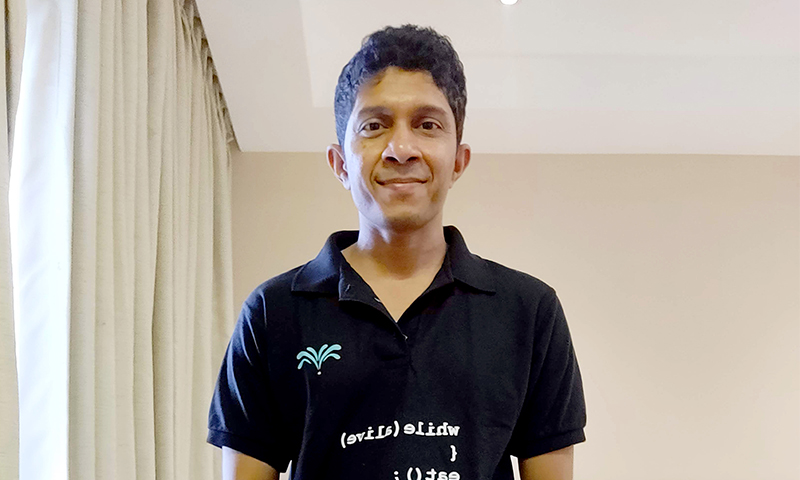The COVID19 outbreak has caused widespread concern and economic hardship for consumers, businesses, and communities across the globe. The disruption has caused an acceleration of remote working, and a rapid focus on evaluating and de-risking the end-to-end value chain. “The impact of COVID19 has made companies realize a bulk of their day to day activities is achievable in WFH itself. This has reduced the rental costs for many companies and it is foreseeable that they will continue this trend and hire teams across the globe. Geographies and nationalities will no longer be the constraint in the Tech Industry,” points out Shirish Surti, CTO, Chai Point.
Currently leading the technology team at Chai Point, one of the largest hot beverages, tea, and coffee chains in India, Shirish’s role is to ensure all the technology needs of Chai Point as a retail brand are fulfilled. Bridging the gap between the board and the team members at Chai Point, he defines the technology road map and ensures steady execution. “As the business has scaled so has the technology team. We hire a lot of good talent, many amongst them are Freshers. Ensuring they undergo good training and are up to mark for hands-on contribution is important. It is important to set the right culture when you are working with people from different generations and backgrounds,” adds Shirish.
A huge success for the company, Chai Point has been able to release some high impact products during the lockdown while remotely working like Whatsapp ordering and Touchless Vending Dispense project, that their customers have adopted these products enthusiastically. Shirish believes that the shift to remote working has been a success because his team members had formed a close bond before WFH began. Currently, as a team, Shirish has ensured every alternate Friday is utilized to connect casually and talk about non-work topics in a group. “We also have a Team Whatsapp group dedicated only for forwards. It is not as good as hanging out with your team over a cup of Chai, but it’s the closest approximation in the digital world. People who share jokes and laugh together form a bond,” quips Shirish.
Right from Point of Sales (PoS) system at the store, where sales data is captured to the Supply chain systems at the warehouse, where the raw materials are dispatched, Shirish has played a huge role in digitizing the end-to-end lifecycle of a retail chain at Chai Point. “We have IoT-enabled tea and coffee vending machines that allow us to capture usage data. We also recently launched a new channel of business that allows customers to order using Whatsapp. We also launched a QR code scan-based capability in all our vending machines to support touchless operations,” adds Shirish.

Humble Beginnings
Growing up in a small 9×10 sq ft room in a chawl in Mumbai with his family, Shirish learned how to work hard and not take anything for granted from the beginning. His interest in gadgets made him join engineering after completing his schooling. Completing his Bachelor’s in Engineering from Sardar Patel Institute of Technology, Shirish was placed in Datamatics Pvt. Ltd., a service provider in the IT space. “While working at Datamatics I realized the knowledge that we learn in college is not enough to be a successful engineer in the IT industry. Hence I took every opportunity to read books on technology that I used at work. During the first 2 years of my job I completed 4 certifications in Java/JEE to acquire good knowledge of the Java/JEE technology, which I was working on in my project”, adds Shirish.
Having this constant urge to do research and pursue higher education, Shirish enrolled himself at IIT Guwahati for the 2 years MTech Programme in Computer Science, as they have the second year dedicated completely to research and also offer stipends. He reminisces, “All my professors were exceptional, they have in-depth knowledge in their area of Teaching. I was able to invent an algorithm and publish a paper on ‘Pseudo stabilizing causal ordering’ at a conference in Caen – France”.
Post IIT, Shirish soon realized he would enjoy working for startups as their team sizes are small and the responsibilities are more and started working with HomeShop18, who were looking to build an e-commerce business in Bangalore during the e-commerce boom in around 2011. Later on, in 2013, he joined another startup, Freecharge, that operated from a 3 BHK Flat in Indiranagar, Bangalore. He recalls, “Freecharge was an exceptional experience, it was a product which our customers loved. My team was responsible for the Growth technology part at Freecharge that included adding technology features in the Freecharge platform to attract new customers and retain existing customers. The scale of Transactions at Freecharge was very high. A downtime of a few minutes would impact a huge number of customers”. Once Freecharge was acquired by Snapdeal, Shirish joined Chai Point as Head of Engineering.
Lead by Example
Making it a point to connect with people, Shirish feels getting to know his team members in a non-work environment helps relieve stress, understand each other better, and establish a good rapport. As a leader, Shirish prefers to lead by example, as he feels to earn respect from good engineers, one has to be a good engineer first. He opines, “When some engineer gets stuck on a technical problem I take the lead and show them how it is solved. When they observe that a problem is solved by choosing the right direction and the right set of knowledge, they realize where they have to improve”.
Life was very different before Playstore was launched. In today’s world, anyone can develop an app and if it is good it will see good adoption organically all thanks to distribution mechanisms like the play store. People talk about apps more often also thanks to the social messaging revolution. Being an early adopter of IoT in Vending Machines at Chai Point, Shirish feels the impact of IoT is going to be huge in the next decade. “We could not imagine a few years back that Vending machines themselves would alert us over the internet about what is wrong in them. All Chai Point vending machines send machine error codes using IoT, thereby triggering a ticketing flow on the repair and maintenance team. It enables us to understand the root cause of the problem even before the customers learn about the problem”, adds Shirish.
As the technology landscape keeps revamping, Shirish feels leaders in the tech industry need to invest a lot of time periodically in learning about new technologies and people skills. He points out, “You ask any leader and they will tell you that working with Baby Boomers, Millennials and Generation Z is very different. This is primarily because of their varying levels of technology exposure. Such factors amplify in a group of engineers”.
Ensuring the safety of our employees was the challenge in 2020 and it will be so in the first half of 2021. Like 2020, the year 2021 is going to be challenging as it will see a lot of change in people’s day to day lives. People and businesses would be looking to get back to their daily rhythm post-Covid. WFH either done by the entire team or not done at all by the bulk of the team is easy to implement. But a partial team WFH requires a lot of effort. In a partial WFH, people working remotely can easily miss out on critical decision-making points. Hoping to have a fruitful 2021, Shirish remarks, “We are all set to bring on board the early adopters and ensure their satisfaction with the products by launching its new Saas products at a bigger scale in 2021”.
As a techie, Shirish is most passionate about the ‘connectivity’ that has been established between a software engineer and the end customer. Like Smartphones connected people, IoT is connecting all devices small and big to Cloud. The cloud platforms like AWS, Azure, and GCP have become mature and are adding new features every month, this helps to process the huge amount of data which is flowing from various channels like IoT. “I feel IoT combined with Edge Computing will drive a lot of Retail, Agriculture, Manufacturing, Supply Chain, and other industrial automation in the next decade. Once you have a good amount of data you can use Machine Learning to create good models for decision making”, concludes Shirish.






